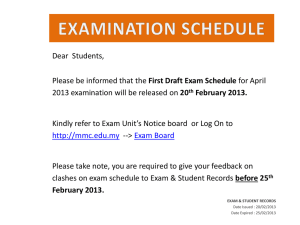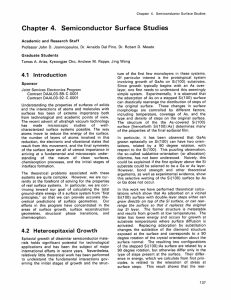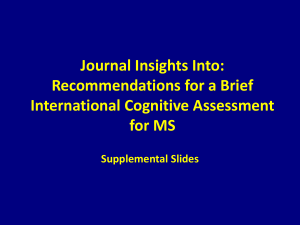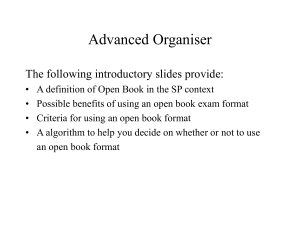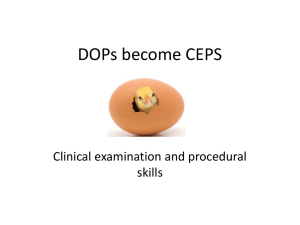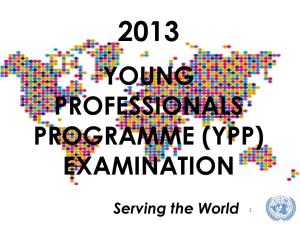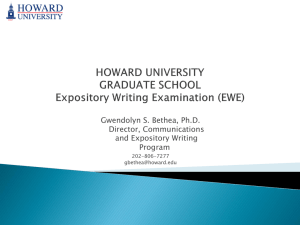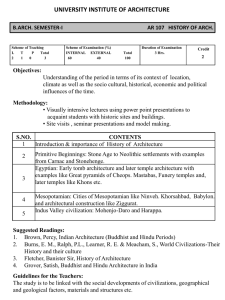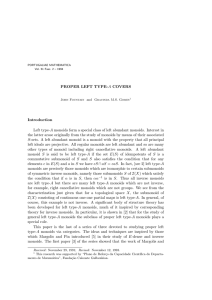preparing effective multiple choice examination questions
advertisement
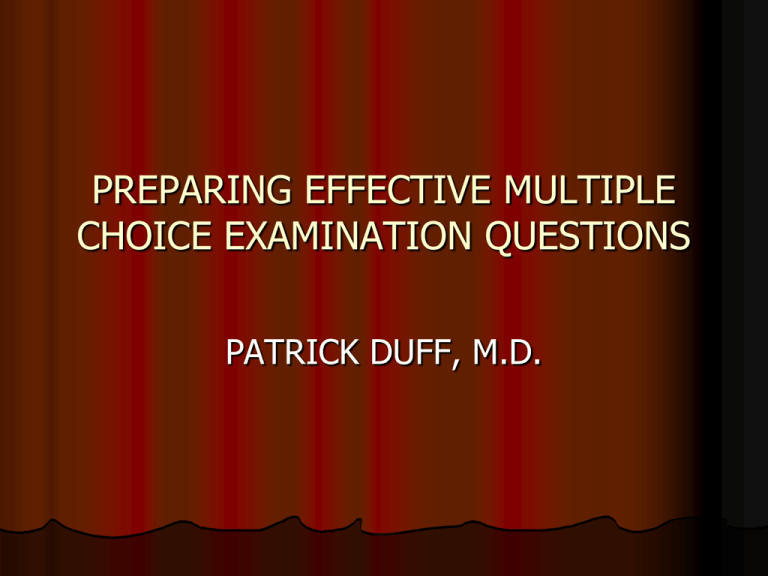
PREPARING EFFECTIVE MULTIPLE CHOICE EXAMINATION QUESTIONS PATRICK DUFF, M.D. LEARNING OBJECTIVES Describe the levels of complexity of an examination question Describe the types of examination questions Describe desirable and undesirable features of examination questions KEY REQUIREMENTS FOR AN EXAMINATION REQUIREMENT DEFINITION Validity Measures what it is supposed to measure Reliability Provides reproducible and consistent results Discrimination Distinguishes between the excellent, very good, and fair student COMPLEXITY OF EXAMINATION QUESTIONS CLASSIFICATION DESCRIPTION Recall Recall of a specific fact Interpretation Identification and interpretation of illustrative material Recall, interpretation, and practical application Problem solving TYPES OF EXAMINATION QUESTIONS TYPE REMARKS C – either, or, both, neither Unacceptable K – select among several alternatives Unacceptable True – false Unacceptable TYPES OF EXAMINATION QUESTIONS TYPE REMARKS A – select the one best answer Ideal question – appropriate for recall, interpretation, problem solving Appropriate for recall, interpretation, and simple management problems B – matching EXAMPLE RECALL Which of the following is the most important risk factor for squamous cell carcinoma of the lung? A. B. C. D. Age > 50 Diabetes Smoking Obesity EXAMPLE INTERPRETATION A 24 year old nulliparous woman at 16 weeks gestation had the following values on her serum analyte screening test: AFP …below the mean HCG…above the mean Estriol…below the mean Inhibin…above the mean EXAMPLE INTERPRETATION Which of the following chromosome abnormalities is her baby most likely to have? A. B. C. D. Triploidy Trisomy 21 45, X Trisomy 18 EXAMPLE INTERPRETATION A term neonate has hepatosplenomegaly, thrombocytopenia, and the diffuse rash noted in the photograph. EXAMPLE INTERPRETATION Which likely? A. congenital infection is most Parvovirus B. CMV C. HIV D. Mumps EXAMPLE PROBLEM SOLVING A 22 year old male has a 48 hour history of malaise, fever (39 deg C), shaking chills, and cough productive of rustcolored sputum. On physical examination, there is dullness to percussion in the lower left lung field, and tubular breath sounds can be heard in this area. EXAMPLE PROBLEM SOLVING Which of the following is most appropriate for treatment of this patient? A. B. C. D. Isoniazid Fluconazole Ceftriaxone Acyclovir APPROPRIATE MIX OF EXAMINATION QUESTIONS Recall Interp Problem GUIDELINES FOR AN EFFECTIVE TYPE-A QUESTION Determine a single clear objective prior to writing the question Have only one objective per question Make sure the question is at an appropriate level of difficulty for the target audience GUIDELINES FOR AN EFFECTIVE TYPE-A QUESTION Correct response should be obvious to the well-informed examinee before the answers are read If the examinee has to read all of the answers before deciding, the question is probably a K-type “disguised” as an A-type TYPE A QUESTION GOOD EXAMPLE Which of the following is the most common complication of multiple pregnancy? A. Gestational diabetes B. Placenta previa C. Postpartum hemorrhage D. Preterm delivery BEWARE THE PSEUDO-A QUESTION All of the following statements about preterm delivery are true except The frequency is 10 %. It can be prevented by use of progesterone. It is more common in whites than in African-Americans. It may result in neonatal RDS. GUIDELINES FOR AN EFFECTIVE TYPE-A QUESTION Include sufficient information in the stem, but avoid unnecessary verbiage Be certain the question has a clear, unambiguous answer GUIDELINES FOR AN EFFECTIVE TYPE-A QUESTION Include 4 to 5 possible answers Be certain the incorrect answers are reasonably plausible TYPE A QUESTION BAD EXAMPLE What is the risk of pregnancy loss after a second trimester amniocentesis? A. 0.5% B. 10 % C. 25 % D. 50 % GUIDELINES FOR AN EFFECTIVE TYPE-A QUESTION Do not use “none of the above” or “all of the above” as distractors Confusing Rewards guessing GUIDELINES FOR AN EFFECTIVE TYPE-A QUESTION Avoid clues in the responses such as answers of unequal length or repetition of key words GUIDELINES FOR AN EFFECTIVE TYPE-A QUESTION Avoid compound answers, ie, answers that include multiple actions TYPE A QUESTION BAD EXAMPLE Which of the following is the most appropriate treatment for communityacquired pnemonia? A. Clindamycin B. Vancomycin C. Valacyclovir D. Administer oxygen, check blood gases, and administer levofloxacin GUIDELINES FOR AN EFFECTIVE TYPE-A QUESTION Be wary of “except” type questions, especially when a “double negative” is present GUIDELINES FOR AN EFFECTIVE TYPE-A QUESTION In certain instances, an “except” type question may be appropriate and may accurately assess the breadth of an examinee’s knowledge TYPE A QUESTION GOOD EXAMPLE All of the following are risk factors for gestational diabetes except A. Obesity B. Positive family history C. Age < 25 y D. History of a macrosomic child GUIDELINES FOR AN EFFECTIVE TYPE-A QUESTION Be certain that illustrative materials are clear and that they reproduce well Vary the correct response among the letters a - d GUIDELINES FOR AN EFFECTIVE TYPE-B QUESTION Clearly identify the nature of the items in column A and column B Include at least 1 or 2 unused distractors GUIDELINES FOR AN EFFECTIVE TYPE-B QUESTION Indicate if answers in one of the columns may be used only once, more than once, or not at all Be certain the matching items are reasonably related to one another GUIDELINES FOR AN EFFECTIVE TYPE-B QUESTION Matching items are particularly useful for testing interpretation skills X-ray ECG Sonogram Histology TYPE B QUESTION GOOD EXAMPLE COLUMN A Antibiotics 1. Clindamycin COLUMN B Target Organisms a. Bacteroides species 2. Penicillin b. Staphylococci 3. Gentamicin c. E. coli d. Group B streptococci TYPE B QUESTION BAD EXAMPLE DRUG PRINCIPAL SIDE EFFECT 1. Nifedipine a. Marrow suppression 2. Ampicillin b. Decreased libido 3. Fluoxetine c. Rash d. Hypotension CONCLUSIONS Use only type-A and type-B questions Minimize recall questions and maximize questions that test interpretive and problem-solving skills CONCLUSIONS Be certain that each question has a single and specific objective Be certain the questions can be answered in the time allotted

